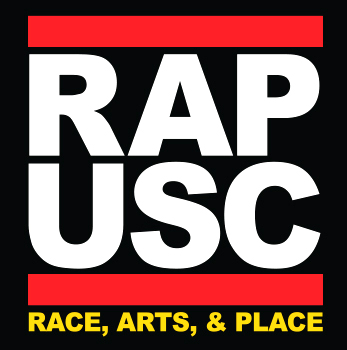As American culture grapples with its legacy of slavery and ongoing racial violence, and as Black scholars demonstrate with ferocious clarity the role of race in defining the very category of the human, the Race, Arts and Place (RAP) collective seeks equitable co-creation in the diverse contact zones between “the university” and “the community.”
RAP is a collective of diverse partners united in a shared desire to transform the ways in which communities and universities have traditionally worked together, focusing specifically on a shift away from research practices that are extractive to ones that are mutually beneficial and generative.
RAP acknowledges the transformative power of art in this context, recognizing its capacity to promote creative, critical, emotional and spiritual connection. Where policy, logic and boundaries push to distinguish the university from its community, RAP seeks zones of interconnection and shared inquiry, working toward not just an equitable future but new ways of knowing and being together.
The RAP Ethical Code
1. We profess the capacity of art to illuminate, reimagine and empower, recognizing art’s ability to transform oppressive structures and to make places of community.
2. We create shared language, acknowledging the power of words to shape our worlds and to either unite or alienate us from each other.
3. We take our time together, valuing relationships that extend and are sustained across years rather than semesters, beyond funding cycles and despite the hardships, knowing that our shared commitment to a different future is not a quick fix or grant deliverable, but a long-term commitment.
4. We share our work and our power, attending to the often unseen and unacknowledged labor of collaboration while also distributing leadership and decision-making.
5. We honor solidarity with the poor, the marginalized and disenfranchised, and work to center what has traditionally been decentered, and do so with a sense of humility.
6. We resist the incessant push for “the new,” acknowledging the value of customs and history, while also welcoming transformation and progressive change.
7. We actively reflect on our practice together, engaging in frequent, honest and possibly messy self-critique, asking if we are truly being accountable.
8. We value art’s multiplicity and variability, preferring an expansive understanding of art’s capacities and forms rather than policing strict and exclusionary definitions.
9. We reimagine research, ignoring extractive practices in favor of inclusive, participatory, generative and reflexive zones of inquiry, and refuse to rank expertise over experience, the universal over the local, and the absolute over the idiosyncratic.
10. We invite the subversion, transgression and reimagining of knowledge as it is currently sanctioned politically, academically, institutionally and culturally, committing ourselves to new ways of being and knowing – often uncomfortably, often joyfully – for a future that is radically equitable and ridiculously creative.
version October 2020
Inspirations for our Statement include: Allied Media: https://www.alliedmedia.org/about/network-principles, Design Justice Network Principles: https://designjustice.org/read-the-principles, Collaboration Principles for Artists & Social Justice Organizers developed by Micah Bazant, Forward Together, and CultureStrike: tdor.co/how-to-reimagine-the-world, and Sasha Costanza-Chock’s Design Justice: Community-Led Practices to Build the Worlds We Need, MIT Press, 2020.

